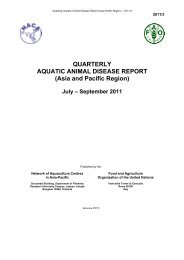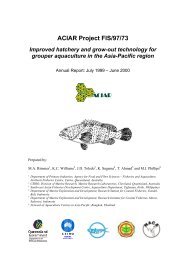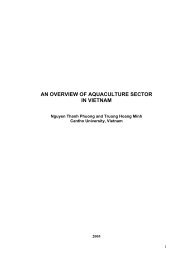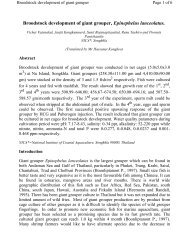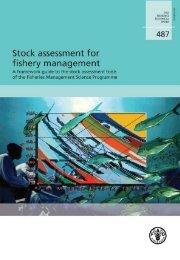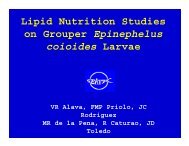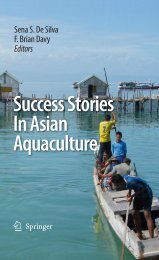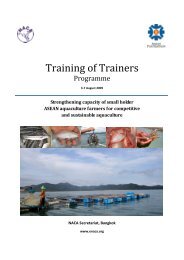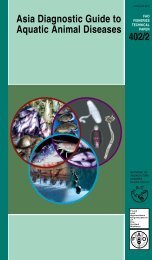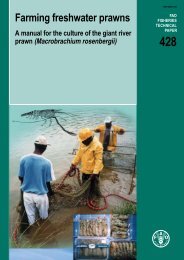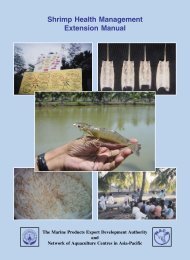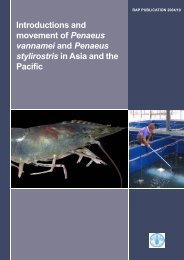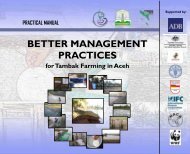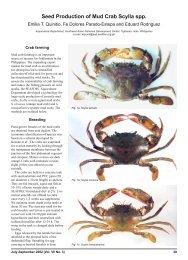(Raa 1996) indicates that it is possible to stimulate a shrimp’s immune system to withst<strong>and</strong> certaindiseases.Harvest of broodstock <strong>and</strong> wild post-larvaeMany farmers in South <strong>and</strong> Central America, Bangladesh, <strong>and</strong> India still depend on wild-caught postlarvae,usually caught by local fishermen. Some shrimp farmers prefer wild-caught PL because <strong>the</strong>ybelieve that <strong>the</strong>se are more resistant to disease, <strong>and</strong> in general more robust, than artificially producedPL.The intensive collection of wild PL may lead to a decline in wild stocks. If this happens, <strong>the</strong> same localfishermen who collect wild PL are <strong>the</strong> ones most likely to suffer. However, <strong>the</strong> impact of collectingwild broodstock <strong>and</strong> post-larvae is controversial. Some authors report that intensive seed-stock fishinghas reduced <strong>the</strong> capture of mature shrimp <strong>and</strong> o<strong>the</strong>r species (Clay 1996), while o<strong>the</strong>rs claim that <strong>the</strong>reis no convincing evidence that shrimp farming has depleted <strong>the</strong> native shrimp in any country (Boyd1997).Using wild broodstock or post-larvae makes it difficult to control <strong>the</strong>ir disease status. By comparison,<strong>the</strong> Norwegian salmon industry has succeeded in reducing disease outbreaks by controlling <strong>the</strong> healthstatus of broodstock, eggs, <strong>and</strong> smolts, as well as by developing <strong>and</strong> using effective vaccines.Dependence on wild seed is <strong>the</strong>refore undesirable in <strong>the</strong> longer term. However, <strong>the</strong> seed captureindustry provides income <strong>and</strong> employment for poor coastal people in many parts of <strong>the</strong> world, <strong>and</strong> anystrategy to promote replacement with hatchery-reared seed must take this into account.Introduction of exotic speciesIn general, introduction of exotic or non-native species into an area is considered undesirable becauseof <strong>the</strong> risk of competition with native species <strong>and</strong> because non-natives may transfer pathogens <strong>and</strong>parasites to which native organisms are not adapted. In a number of countries, this threat is consideredso serious that introduction of non-native species is prohibited by law, for example in Norway <strong>and</strong>some o<strong>the</strong>r European countries.While it is documented that importing living non-native shrimp has introduced new pathogens (importof P. monodon to Latin America brought White Spot Virus), <strong>the</strong>re does not appear to be anydocumentation of uncontrolled proliferation of new shrimp species resulting from importation. Thespread of new diseases <strong>and</strong> uncontrolled reproduction of new species should be regarded as ecologicalrisks unless it is firmly demonstrated that no harmful effects on native shrimp or o<strong>the</strong>r populations willresult from introduction of a non-native species. In general, <strong>the</strong> export <strong>and</strong> import of non-native shrimpacross borders <strong>and</strong> continents should be discouraged <strong>and</strong> international protocols strictly followed.Ab<strong>and</strong>onment of pondsSignificant areas in some of <strong>the</strong> most important producer countries have been ab<strong>and</strong>oned by shrimpfarmers. Usually, disease has made production unprofitable in <strong>the</strong>se locations, so <strong>the</strong> farmers have beenforced to quit. In many cases, <strong>the</strong>se ponds will be put into shrimp production again, as has happened inThail<strong>and</strong> <strong>and</strong> China, when disease incidence declines or when improvements in management practicesmake production profitable once again. Sometimes <strong>the</strong> resumed production intensity is lower <strong>and</strong>, insome instances, shrimp are grown in polyculture.In Thail<strong>and</strong>, <strong>the</strong> National Economic <strong>and</strong> Social Development Board reports that 24% of <strong>the</strong> shrimpfarms established in mangrove areas are ab<strong>and</strong>oned after 2–4 years because of disease <strong>and</strong> productionproblems, <strong>and</strong> that <strong>the</strong>se sites are unsuitable for o<strong>the</strong>r purposes such as agriculture (Anon. 1997b).O<strong>the</strong>r estimates for pond life expectancy range from 5–15 years (Flaherty & Karnjanakesorn 1995). Ithas been suggested that <strong>the</strong> life span of shrimp culture ponds depends on <strong>the</strong> stocking density, food <strong>and</strong>feeding regime, quality of <strong>the</strong> bottom soil, <strong>and</strong> water temperature (Matsusato 1993). In certaininstances of extensive shrimp culture, farm life spans of up to 50 years may be observed.33
In practice, this analysis may be misleading, especially about <strong>the</strong> relationship between ab<strong>and</strong>onment<strong>and</strong> intensity. If badly planned <strong>and</strong> sited with inadequate or poor water supply, extensive ponds may beab<strong>and</strong>oned ra<strong>the</strong>r quickly, as has happened in parts of Vietnam. On <strong>the</strong> o<strong>the</strong>r h<strong>and</strong>, some well-managedintensive ponds have been in operation for many years <strong>and</strong> are likely to continue for many more.Critical factors are soil <strong>and</strong> water quality, <strong>and</strong> <strong>the</strong> balance between husb<strong>and</strong>ry, management skills, <strong>and</strong><strong>the</strong> level of intensity. Markets also play a role <strong>and</strong> may interact with o<strong>the</strong>r factors. For example,production is likely to cease if disease is widespread <strong>and</strong> prices are relatively low.Many areas chosen for shrimp farms are simply not well suited for this activity. A classic example ofimproper groundwork in site selection occurred in Malaysia in <strong>the</strong> early 1980s, when a largecommercial investor (one of <strong>the</strong> old plantation companies) selected a site for shrimp farming withoutundertaking a proper examination of soil <strong>and</strong> water quality. The venture was a failure, <strong>and</strong> <strong>the</strong>corporation left <strong>the</strong> shrimp farming business altoge<strong>the</strong>r.Mitigation <strong>and</strong> restorationIn practice, most shrimp farm sites are chosen on <strong>the</strong> basis of availability ra<strong>the</strong>r than suitability, <strong>and</strong>government intervention in <strong>the</strong> form of l<strong>and</strong> use policy <strong>and</strong> planning may <strong>the</strong>refore be required toaddress this issue. Similarly, matching skills with local circumstances <strong>and</strong> production intensity willrequire government support in <strong>the</strong> form of training <strong>and</strong> information dissemination. The dangers ofallowing this function to be undertaken by <strong>the</strong> private sector (input suppliers) have already been noted.If ponds are none<strong>the</strong>less ab<strong>and</strong>oned, <strong>the</strong> question arises of whe<strong>the</strong>r to restore to natural habitat orconvert to alternative productive use. Rehabilitation of mangrove areas that have been cleared forshrimp farming has been undertaken in some areas. This process is nei<strong>the</strong>r difficult nor costly(Mackintosh 1996) so long as an appropriate tidal/hydraulic regime can be re-created. However, thatstep is not always easy, especially if development activities have occurred, including canal <strong>and</strong> roadconstruction <strong>and</strong> o<strong>the</strong>r infrastructure activities. At a minimum, however, effective breaching of dikes isrequired (Stevenson 1997; Stevenson, Lewis, & Burbridge, in press). Where natural mangrove issparse, <strong>the</strong>re may also be a shortage of mangrove propagules, in which case nursery production willincrease overall costs.Conversion of such areas to alternative productive use is more difficult, since mangrove soils arecommonly unsuitable for agricultural purposes.Where ponds have been developed on l<strong>and</strong> previously used for rice, rubber, coconut, or similar crops,restoration may be more difficult, depending on <strong>the</strong> extent to which <strong>the</strong> hydraulic regime has beendisrupted <strong>and</strong> soils salinized.The use of fishmeal in shrimp feedsCompound shrimp <strong>and</strong> finfish feed typically contain a significant proportion of fishmeal <strong>and</strong> fish oil,which contribute to a high nutrition diet. There is a concern that aquaculture will put significantdem<strong>and</strong>s on <strong>the</strong> supply of fishmeal in <strong>the</strong> future (Tacon 1996) <strong>and</strong> that this will increase pressure oncapture fishery resources, leading to depletion. Fur<strong>the</strong>rmore, it has been argued that <strong>the</strong> conversion ofone form of fish into ano<strong>the</strong>r is necessarily inefficient <strong>and</strong> wasteful. <strong>Shrimp</strong> farming is <strong>the</strong>refore badfor <strong>the</strong> environment <strong>and</strong> questionable for food security (Naylor et al. 1998).There is little doubt that dependence on fishmeal poses a long-term financial risk to shrimp farming<strong>and</strong> <strong>the</strong> culture of o<strong>the</strong>r species (including intensive livestock production of all kinds) that require highqualityprotein feeds. It is also <strong>the</strong> case that many fisheries, including some of those for “trash” fish, arenot being managed sustainably, <strong>and</strong> that a truly environmentally responsible industry will seek tominimize its use of inputs from unsustainable sources.However, <strong>the</strong> issue is extremely complex. The argument that aquaculture will be responsible for <strong>the</strong>demise of <strong>the</strong>se fisheries, or that aquaculture actually decreases food security, is questionable.Aquaculture represents only one of many sources of dem<strong>and</strong> for industrial fish <strong>and</strong> fish products, <strong>and</strong>whatever course aquaculture takes in <strong>the</strong> future, it is likely that <strong>the</strong> dem<strong>and</strong> for fishmeal <strong>and</strong> fish oilswill remain strong. In any case, fishmeal <strong>and</strong> fish oil are produced mainly from species that are not34
- Page 7 and 8: sensitivity analysis should include
- Page 9 and 10: ABBREVIATIONSMTkgmcmhaozPUDFOBCIFC&
- Page 11 and 12: ORGANIZATION OF THE REPORTIn Chapte
- Page 13 and 14: same time, development is necessary
- Page 15 and 16: Current shrimp farming practice inc
- Page 17 and 18: Current status of the industryToday
- Page 19 and 20: In recent years, several major crop
- Page 21: CHAPTER 2: SHRIMP FARMING SYSTEMSSh
- Page 24 and 25: FeedsHatcheries use a combination o
- Page 26 and 27: FIGURE 8. CONTINUUM OF DIFFERENT SH
- Page 28 and 29: TABLE 3. COMPARISON OF INPUTS FOR T
- Page 30 and 31: Shrimp farming systems vary greatly
- Page 32 and 33: creeks, and sea-grass beds, fulfill
- Page 34 and 35: arrangement in Thailand, for exampl
- Page 36 and 37: capacity is not exceeded, the nutri
- Page 38 and 39: shrimp or high-value finfish produc
- Page 40 and 41: In more immediately practical terms
- Page 42 and 43: Disease prevention and managementDi
- Page 46 and 47: suitable for human consumption or f
- Page 48 and 49: • Supply and effluent canals shou
- Page 50 and 51: CHAPTER 4: SOCIAL AND ECONOMIC IMPA
- Page 52 and 53: opportunities would need to be iden
- Page 54 and 55: 26 workdays per hectare, and an ext
- Page 56 and 57: One of the key elements for success
- Page 58 and 59: Minimizing negative social repercus
- Page 60 and 61: CHAPTER 5: FINANCIAL RISKS ASSOCIAT
- Page 62 and 63: Credit riskAccess to credit at fair
- Page 64 and 65: Natural factorsShrimp diseaseThe ou
- Page 66 and 67: CHAPTER 6: PLANNING AND MANAGEMENT
- Page 68 and 69: Planning and resource managementIna
- Page 70 and 71: Such initiatives have been or are b
- Page 72 and 73: Conclusions and recommendationsReco
- Page 74 and 75: equired to promote sustainability a
- Page 76 and 77: CHAPTER 7: PROJECT PLANNING AND ASS
- Page 78 and 79: • Appraisal and supervision missi
- Page 80 and 81: The structure of the executive summ
- Page 82 and 83: CHAPTER 8: CONCLUSIONS, RECOMMENDAT
- Page 84 and 85: • Requirements and guidance for f
- Page 86 and 87: EmploymentAs mentioned in the repor
- Page 88 and 89: ANNEX 1: A BLUEPRINT FOR FEASIBILIT
- Page 90 and 91: • Sensitivity calculations and an
- Page 92 and 93: Table A4: World shrimp farming prod
- Page 94 and 95:
ANNEX 4: CASE STUDIES UNDERTAKEN BY
- Page 96 and 97:
ColombiaThe Adoption of Good Manage
- Page 98 and 99:
LocationAppendix A--Meetings Held o
- Page 100 and 101:
LocationAppendix A--Meetings Held o
- Page 102 and 103:
LocationAppendix A--Meetings Held o
- Page 104 and 105:
BIBLIOGRAPHYAdger, W.N. 1998. Susta
- Page 106 and 107:
Claridge, G. 1996. Legal approaches
- Page 108 and 109:
Hambrey, J.B., M. Phillips, K. Chow
- Page 110 and 111:
Phillips, M.J., & D.J. Macintosh. 1
- Page 112:
World Commission on Environment and



